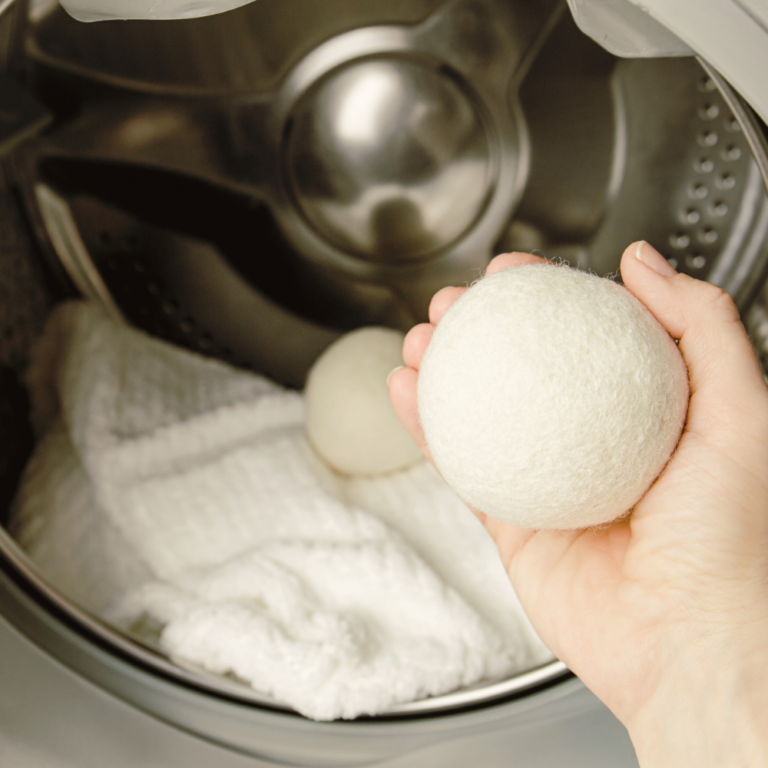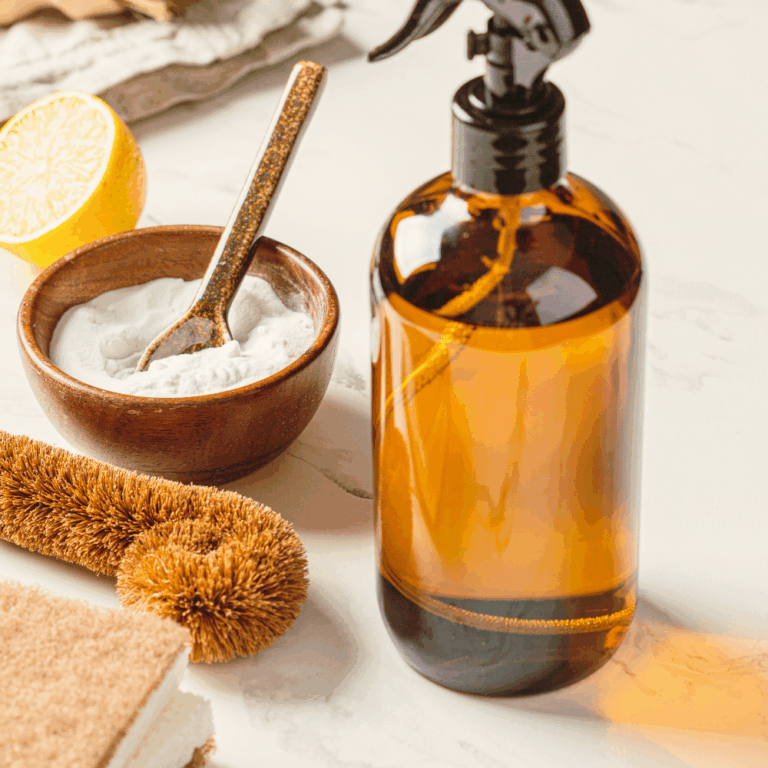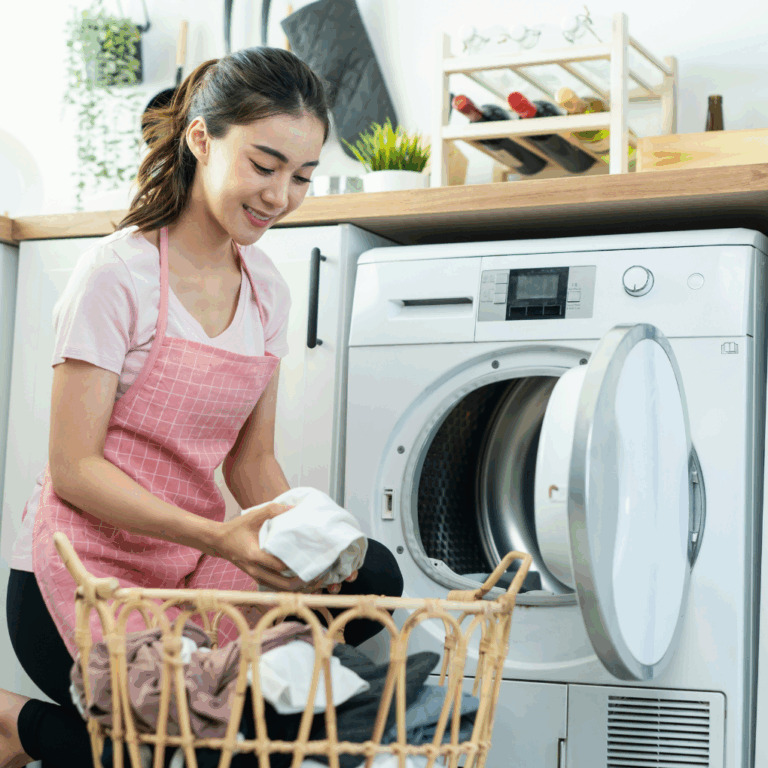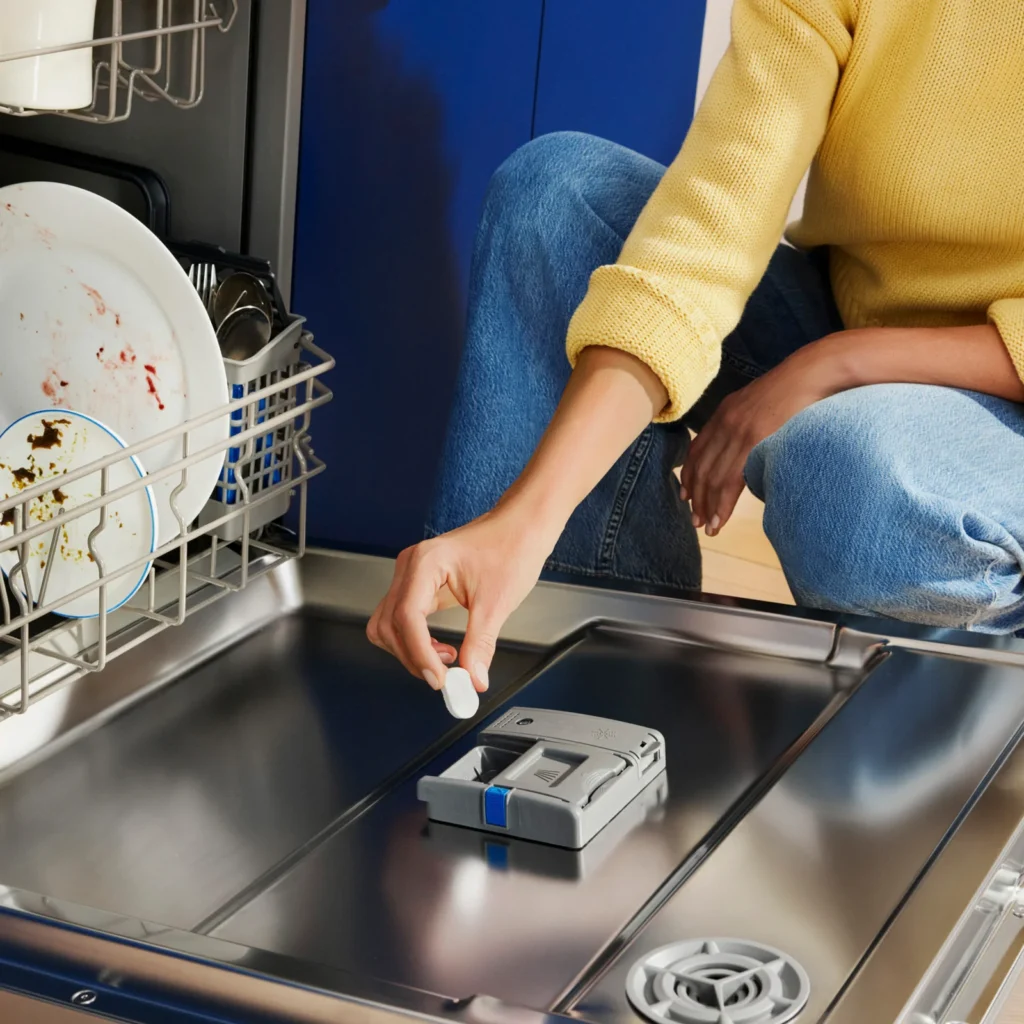
Key Takeaways
- Most dishwasher pods contain PVA film — a dissolvable plastic that can persist in soil and water.
- Plastic-free detergents use compostable packaging, bio-enzymes, and plant-based formulas instead.
- Certified brands like Blueland, Dirty Labs, and Branch Basics are safer for your dishes and the planet.
Dishwasher detergent might not be the first thing that comes to mind when considering plastic waste, but it probably should be. From hard plastic tubs to “dissolvable” pods wrapped in synthetic films, conventional detergents carry a hefty environmental cost. And that’s before we even talk about the cocktail of chemicals they often leave behind on your plates.
As more people start paying attention to what’s in their cleaning products (and how they’re packaged), the push for plastic-free and non-toxic alternatives has grown. We’re not just looking for sparkling dishes, we’re looking for solutions that won’t leave behind microplastics or petrochemical residues in our kitchens or waterways.
This guide explains why switching to a plastic-free dishwasher detergent matters, what ingredients to avoid, and which brands are leading the way toward safer, low-waste cleaning.
Why Go Plastic Free with Your Dishwasher Detergent?
It’s easy to assume those shiny little pods are harmless; they’re small, convenient, and marketed as “dissolvable.” However, many people are unaware that most conventional dishwasher detergents are formulated with polyvinyl alcohol (PVA or PVOH), a synthetic plastic that dissolves in water but may not fully biodegrade in the environment.
And then there’s the packaging. Many detergent brands still rely on single-use plastic tubs or pouches, even when the detergent is in tablet or powder form. With dishwashing being a near-daily habit for many households, that’s a lot of plastic waste over time, most of which won’t be recycled.
While these films are water-soluble, that doesn’t guarantee complete biodegradation. There’s conflicting evidence on whether PVA films entirely break down in real-world wastewater systems — some studies suggest that up to 75% of intact PVA particles from detergent pods may enter aquatic environments because the conditions for complete degradation aren’t always met.
Switching to plastic-free dishwasher detergent reduces both visible plastic waste and invisible microplastic pollution. It also supports brands that are actively rethinking what safe, effective, and sustainable cleaning can look like, whether by using refillable tins, compostable wrappers, or eliminating synthetic additives.
Environmental and Health Benefits of Plastic-Free Dishwasher Detergents
Choosing a plastic-free dishwasher detergent isn’t just good for the planet; it’s better for your home, your dishes, and your health. Conventional dishwasher detergent tablets and pods often contain a chemical-heavy ingredient list. They are wrapped in synthetic materials, such as polyvinyl alcohol (PVA), which may not fully break down after use. That means these products can leave behind more than just a clean plate.
🌎 Better for the Environment
Plastic-free dishwasher tablets are usually packaged in cardboard, metal tins, or compostable pouches—eliminating the need for hard plastic tubs or plastic-lined bags. That’s a big win for reducing packaging waste, especially since dishwashing is a near-daily habit.
By avoiding ingredients like phosphates, chlorine-based cleaners, and petroleum-based surfactants, plastic-free detergents also help protect waterways. These compounds have been linked to algal blooms, aquatic toxicity, and long-term ecosystem damage. With plant-based, biodegradable formulas, you can wash your dishes without contributing to microplastic pollution or chemical runoff.
🏡 Safer for You and Your Home
Many conventional detergents include synthetic fragrances, dyes, and optical brighteners that can leave residue on dishes and irritate sensitive skin or airways. Plastic-free options are often formulated without these additives, relying instead on naturally derived ingredients that are safer for human health.
Some brands even earn third-party certifications, such as EPA Safer Choice, MADE SAFE, or EWG Verified. These labels indicate that the products have been tested for known toxins and are designed to be safer for both people and the environment.
💧 Works with All Water Types and Dishwashers
Most plastic-free dishwasher tablets are designed to work in both standard and high-efficiency (HE) dishwashers. They also tend to perform well in various water types, including hard water, which helps prevent film buildup without harsh chemical boosters.
Whether building your starter set for a plastic-free cleaning routine or testing a new eco swap, these detergents offer a safer, more sustainable way to get the job done.
What Makes a Dishwasher Detergent “Plastic Free”?
When looking for a truly plastic-free dishwasher detergent, it’s essential to check both the packaging and the product itself:
- No plastic packaging: Instead of plastic tubs or plastic-lined bags, look for cardboard boxes, metal tins, compostable pouches, or refillable glass jars.
- The detergent does not contain plastic. Most pods are wrapped in polyvinyl alcohol (PVA or PVOH), a synthetic polymer that dissolves in water but does not always fully break down in natural environments.
While it’s true that water from our dishwashers usually flows to wastewater treatment plants, that doesn’t mean PVA disappears. These films are water-soluble, but that doesn’t guarantee complete biodegradation. Recent studies show that PVA often only partially breaks down during treatment, and the remaining fraction can slip through into treated water or end up in sewage sludge spread on farmland.
Ingredients to Avoid in Dishwasher Detergent
If you’ve ever flipped over the back of a detergent box and felt like you were reading a chemistry textbook, you’re not alone. Many conventional dishwasher detergents come loaded with ingredients that do more harm than good—for both the environment and your home.
❌ Here are a few common ones worth avoiding:
- Synthetic fragrances: These don’t just “smell clean”—they’re often made from undisclosed chemical blends that can linger on dishes and irritate sensitive skin or airways.
- Dyes and optical brighteners: They’re added to make your detergent look pretty or your glassware seems extra shiny, but they serve no cleaning purpose and can pollute waterways after use.
- Phosphates and chlorine-based cleaners: Once widely used for their grease-cutting power, these ingredients can disrupt aquatic ecosystems and contribute to harmful algal blooms. Many have been phased out—but not all.
- Petroleum-based surfactants: These help break down grease, but they’re derived from fossil fuels and can be toxic to aquatic life. Look for plant-based alternatives instead.
- Polyvinyl alcohol (PVA/PVOH): Often overlooked, this is the “dissolvable” plastic film in most pods. It may dissolve in water, but that doesn’t mean it fully biodegrades, especially once it leaves your dishwasher.
1. Blueland
$21
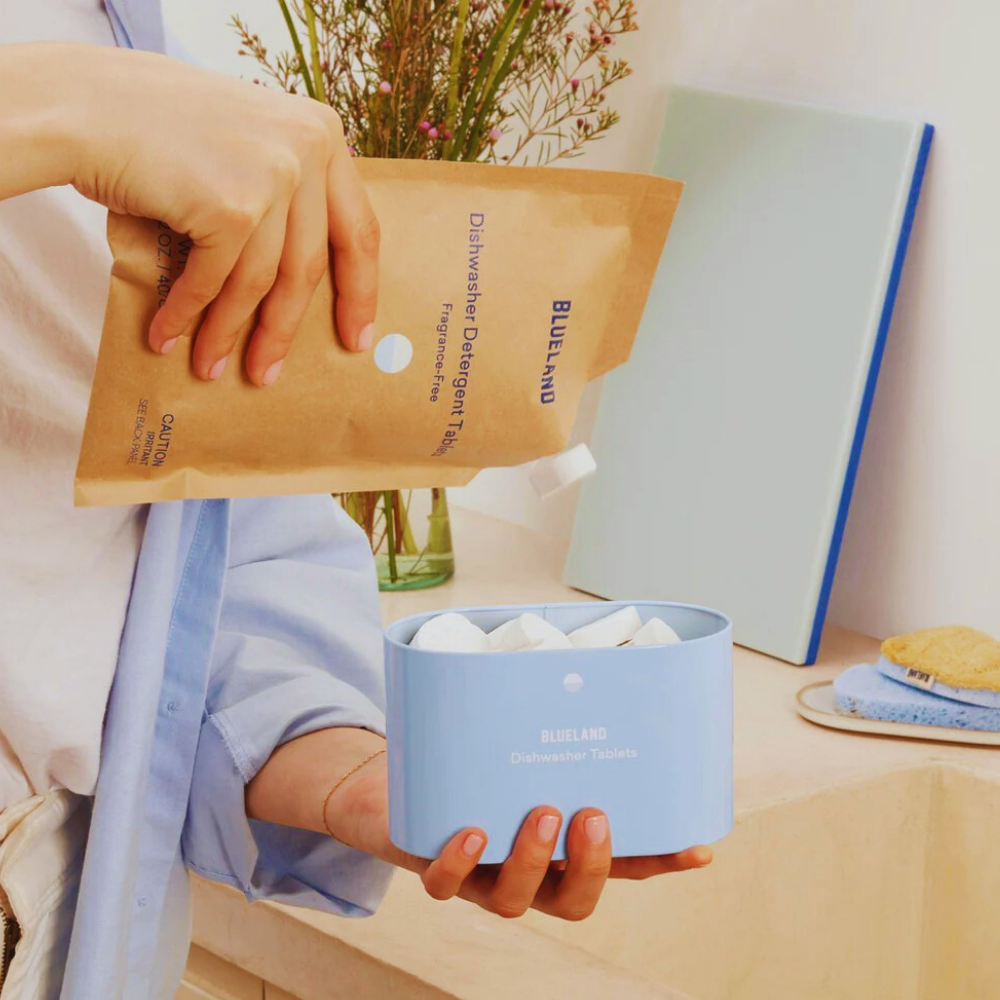
Blueland isn’t just another eco brand; they’re redefining what sustainable cleaning looks like. In 2024, they teamed up with NYC Council Member James F. Gennaro to champion the “Pods Are Plastic” bill, pushing to ban dishwasher and laundry pods made with polyvinyl alcohol (PVA).
That advocacy says it all — Blueland walks the talk when it comes to eliminating hidden plastics from our homes.
They are also my personal favorite. After testing several brands, Blueland’s tablets came out on top: no pods stuck in the tray, no overpowering scent, sparkling-clean dishes, and zero plastic waste.
- Packaging: Refillable metal tin with compostable paper.
- Certifications: EPA Safer Choice, Cradle to Cradle Gold, Leaping Bunny certified.
Other Top Picks
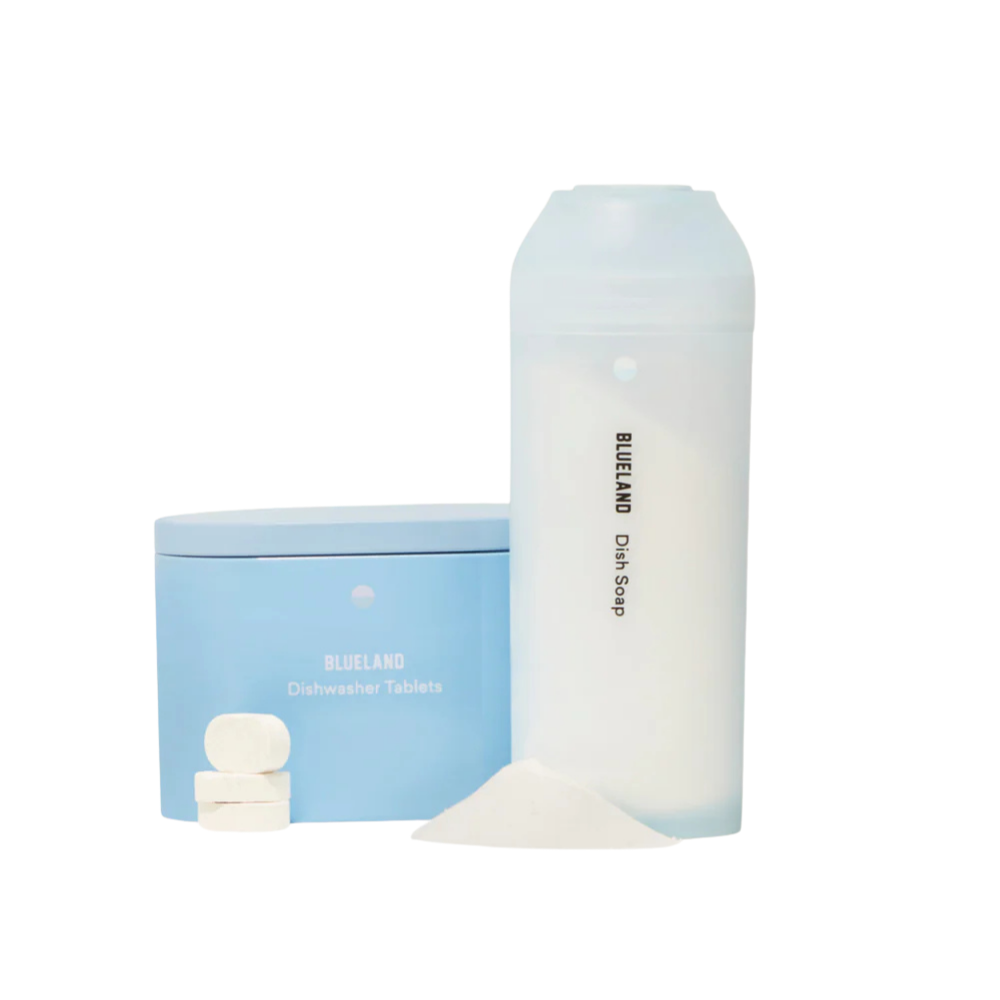
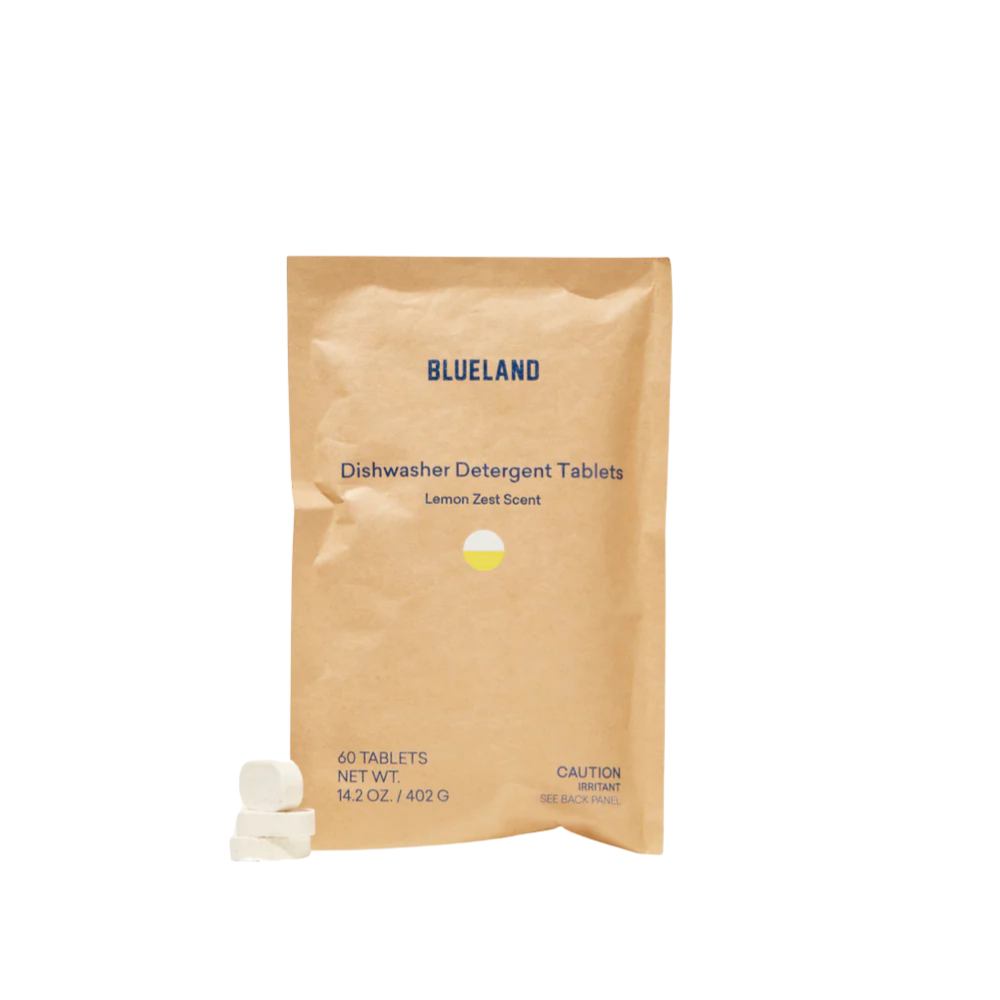
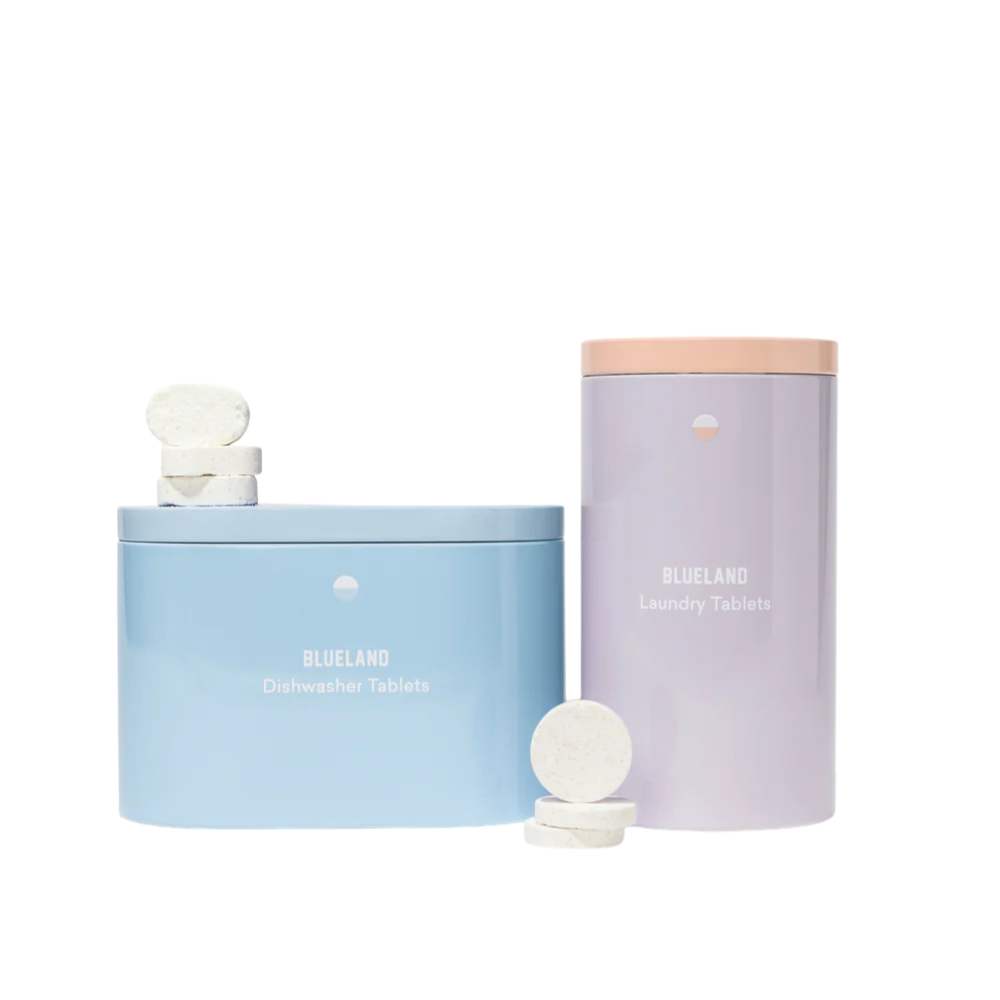
2. Dirty Labs
$18
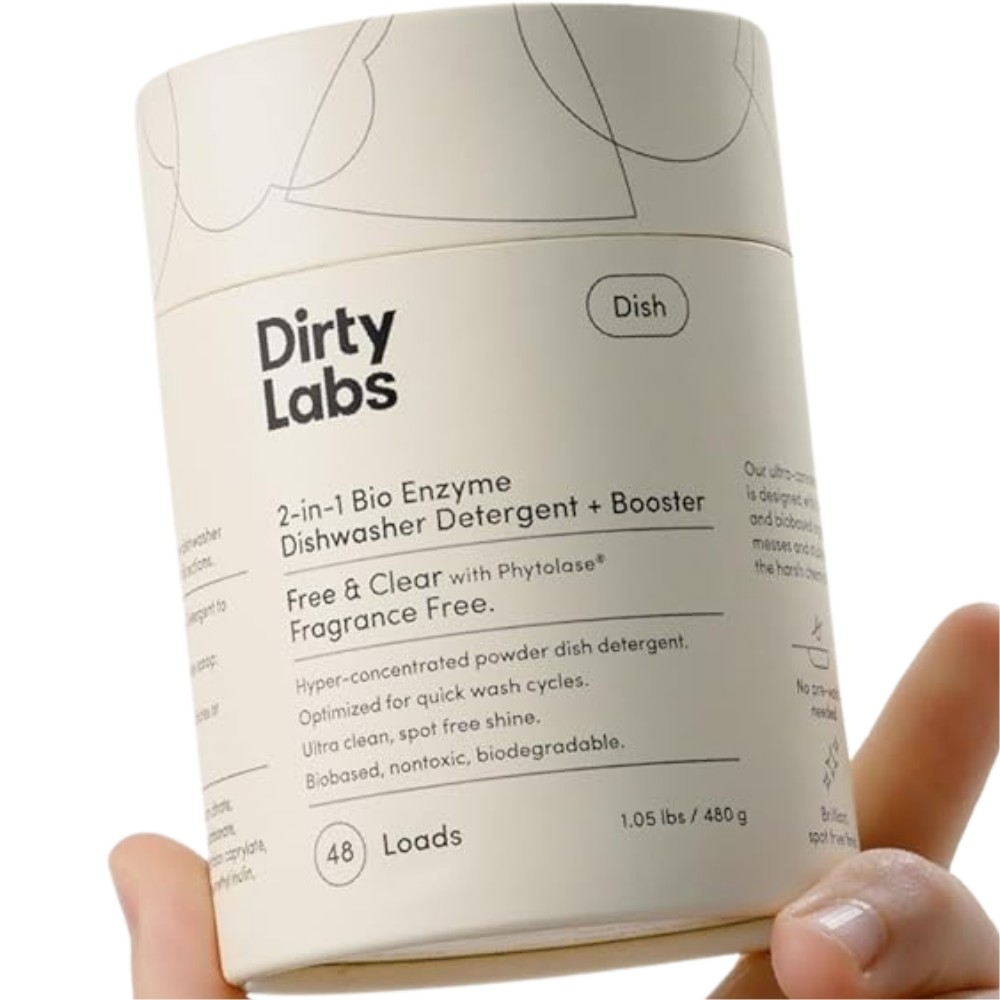
Dirty Labs is changing the way we think about clean. This science-driven brand creates formulas that replace harsh petrochemicals with more innovative, bio-based ingredients. Their Bio Enzyme Dishwasher Detergent is a standout, clever 2-in-1 design that works as both a detergent and rinse aid.
Instead of relying on heavy chemicals, it uses advanced bio-enzymes to break down grease, food particles, and stubborn residue — leaving dishes spotless without the toxins or plastic waste.
- Packaging: Recyclable cardboard box with a wooden scoop from responsibly sourced schima superba wood.
- Certifications: USDA Certified Biobased, EPA Safer Choice, Leaping Bunny certified.
Other Top Picks
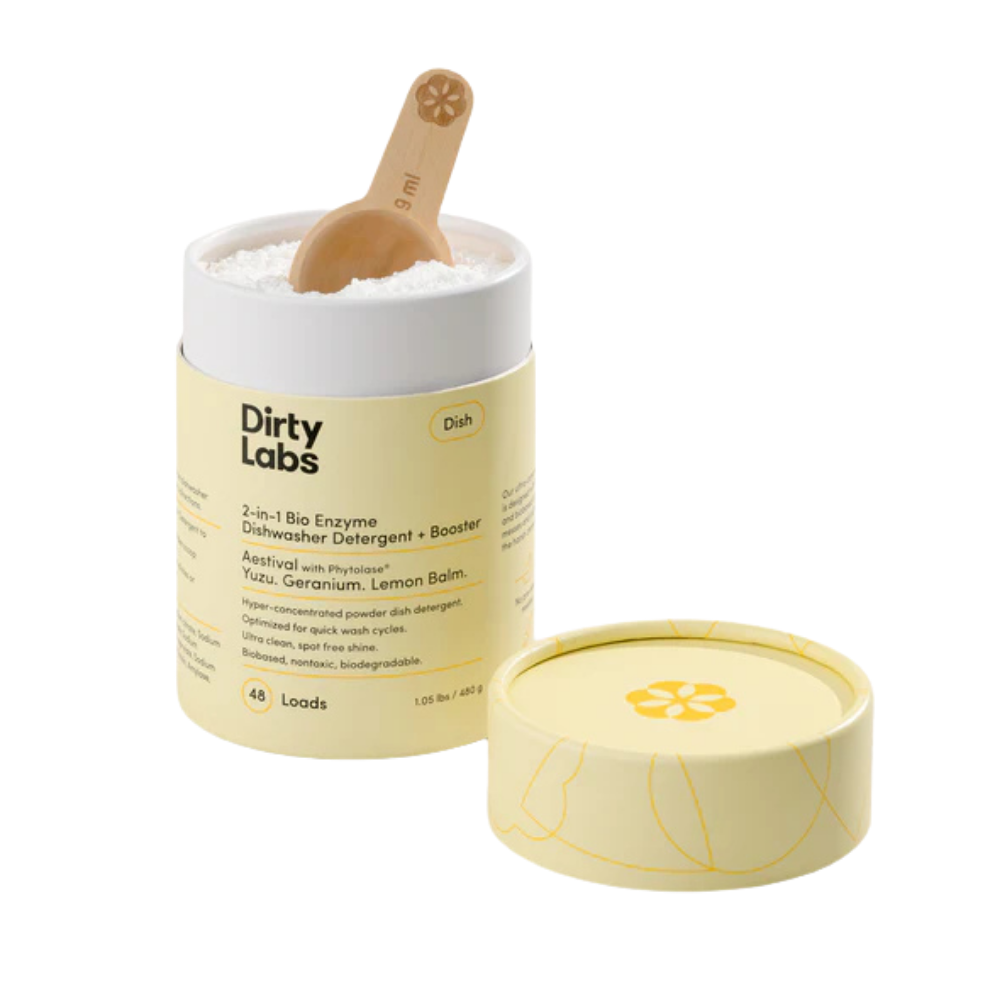
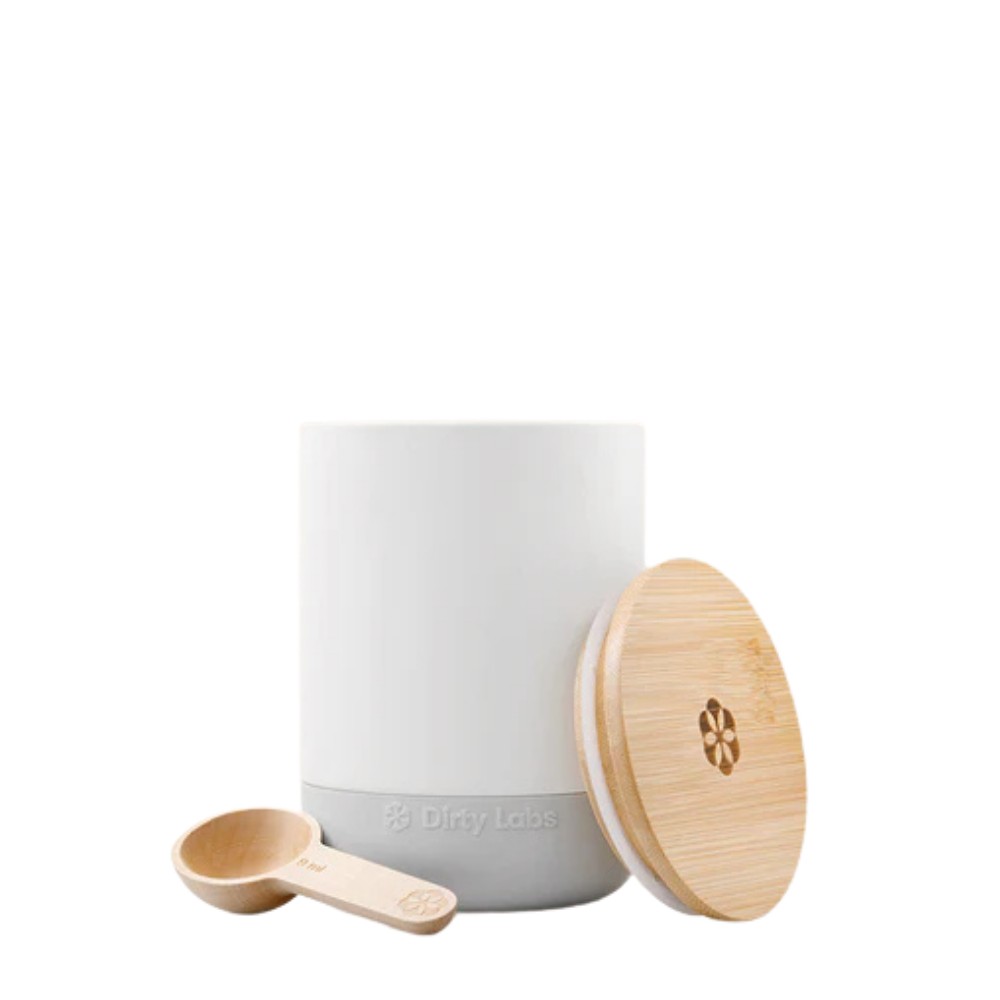
3.Green Llama
$15.95
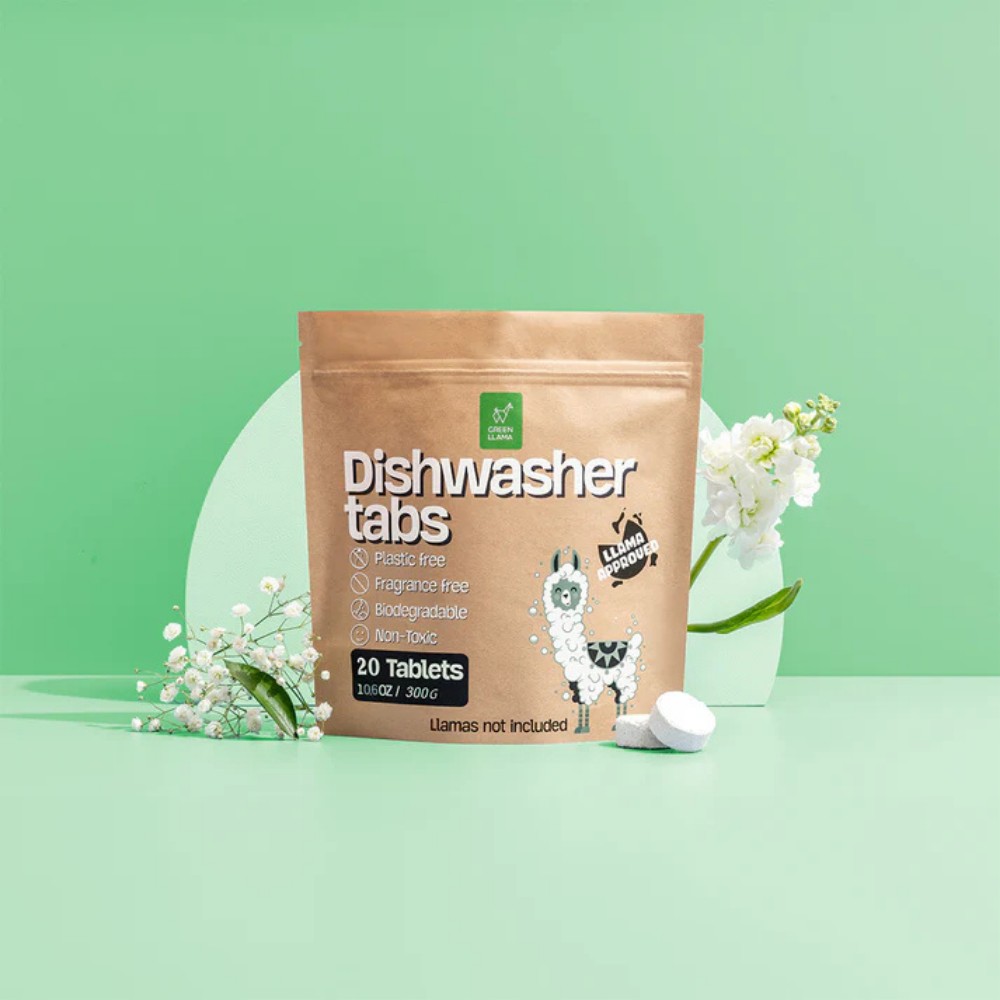
Green Llama was started with one clear mission: to make cleaning safer for people and the planet. This woman-owned brand skips the greenwashing and focuses on what really matters — clean ingredients that actually work.
Their dishwasher tablets are truly plastic-free, no polyvinyl alcohol (PVA), no hidden coatings, no gimmicks. Just powerful, eco-friendly cleaning in compostable packaging you can feel good about using every day.
- Packaging: 100% plastic-free, compostable packaging.
- Certifications: Leaping Bunny
Other Top Picks
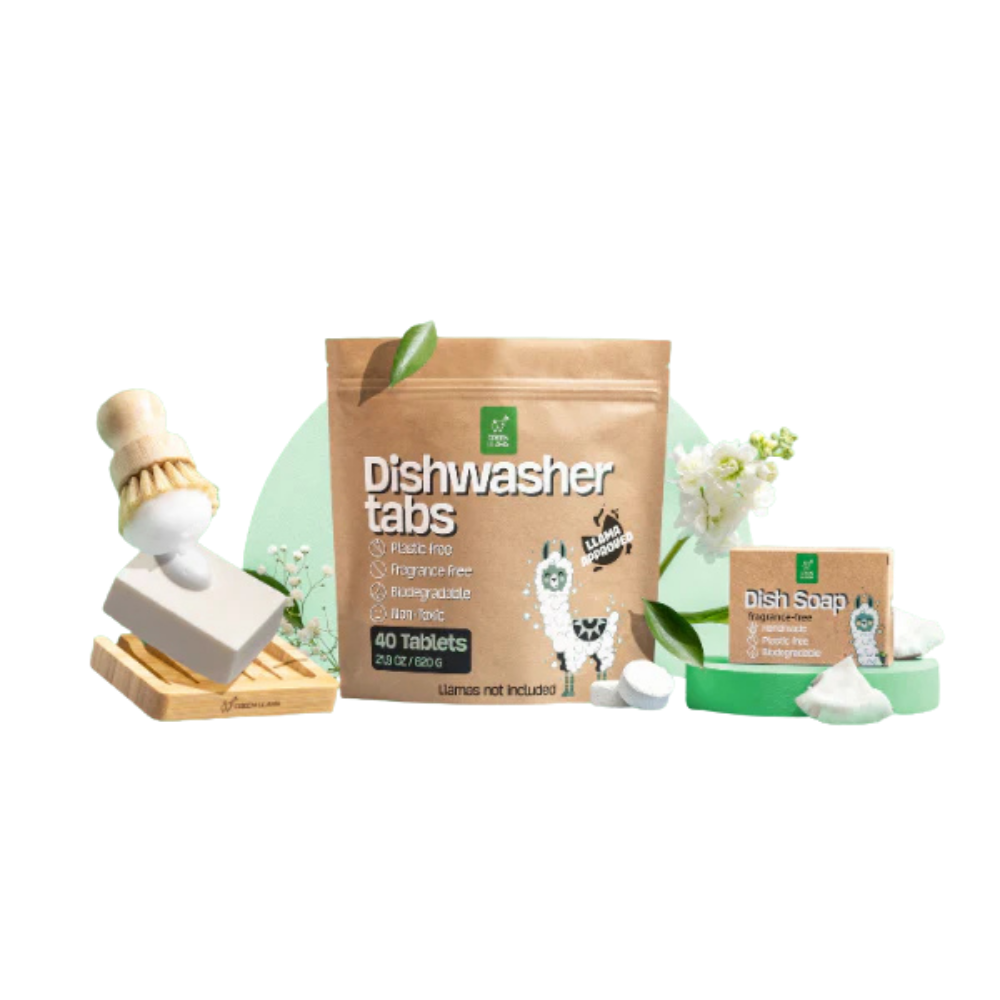
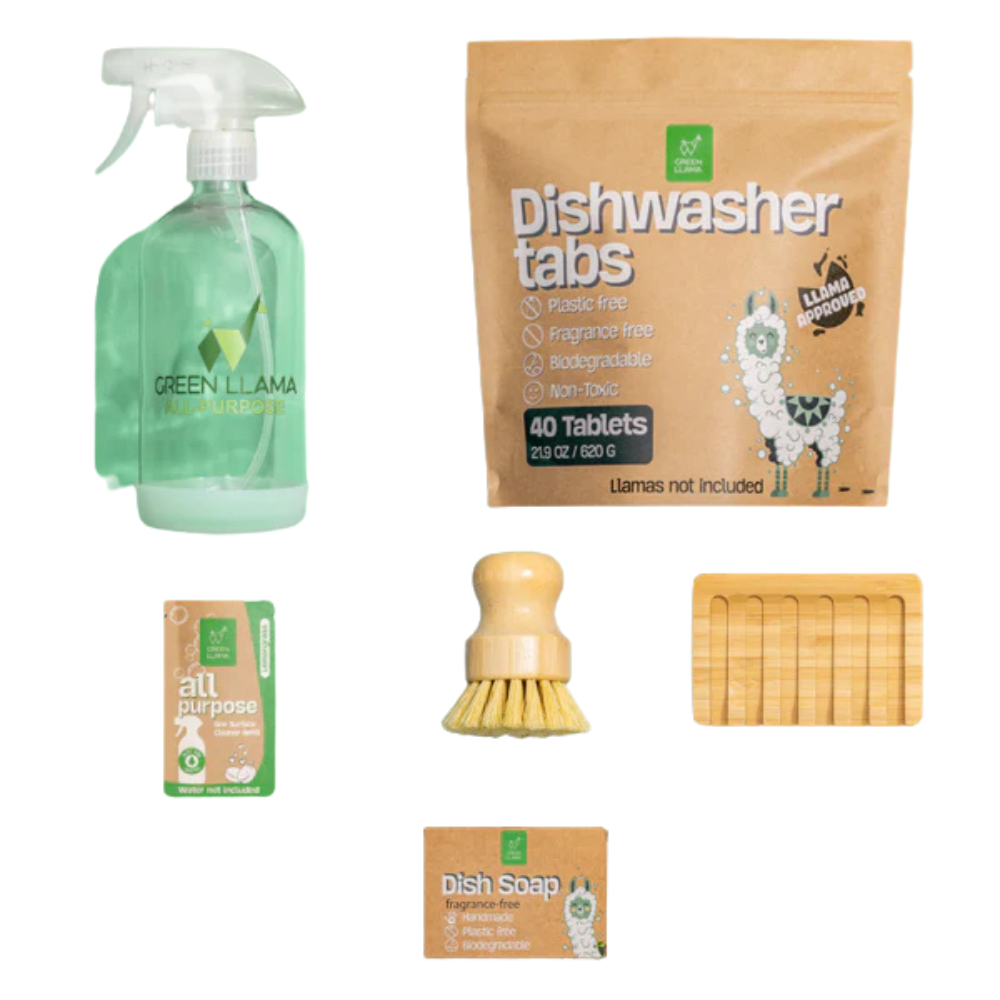
4. Branch Basics
$15
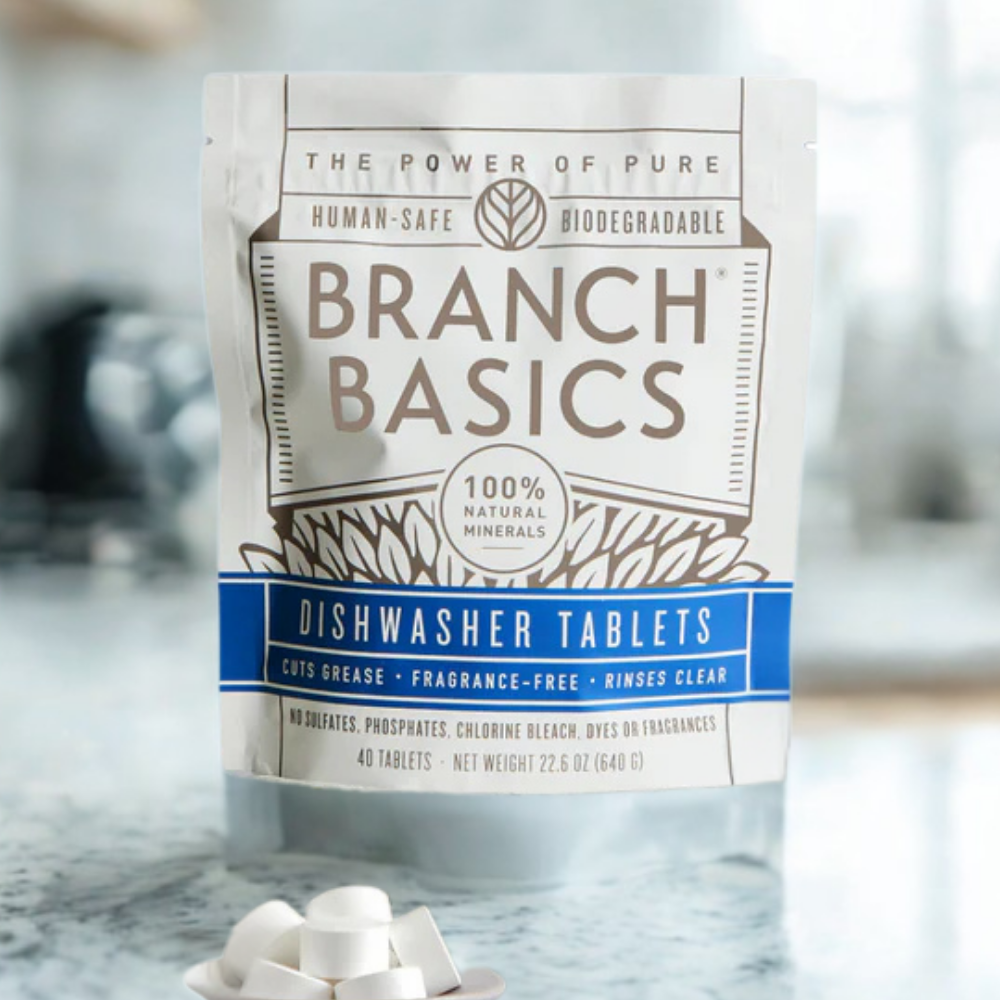
Branch Basics was created by women who believe that clean should mean truly clean — no hidden toxins, no confusing labels.
Their dishwasher tablets are free of PVA, synthetic fragrances, and dyes, and are packed in plastic-free packaging that aligns perfectly with a low-waste lifestyle.
Made with plant- and mineral-based ingredients and certified by MADE SAFE, Branch Basics is a go-to for a simple, effective, and genuinely sustainable way to get spotless dishes.
- Packaging: Plastic-free packaging.
- Certifications: MADE SAFE, EWG Verified, Leaping Bunny certified.
Other Top Picks
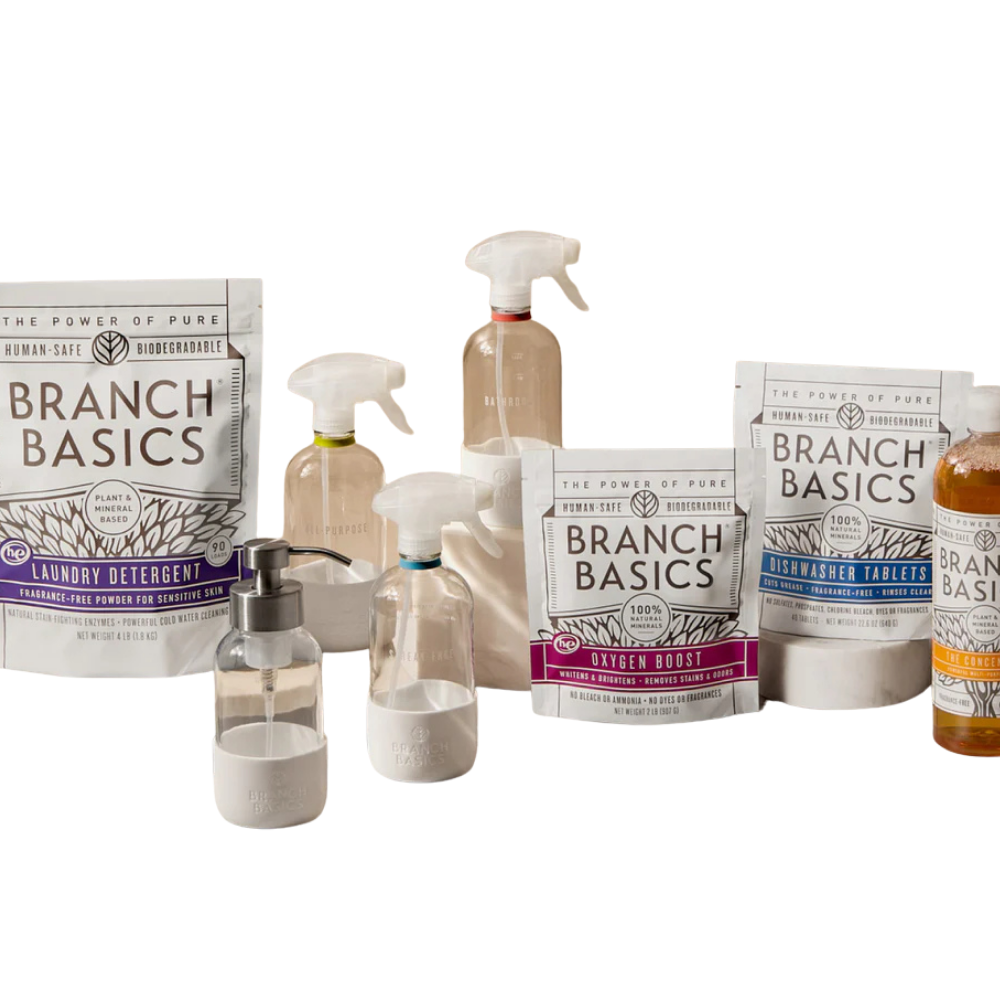
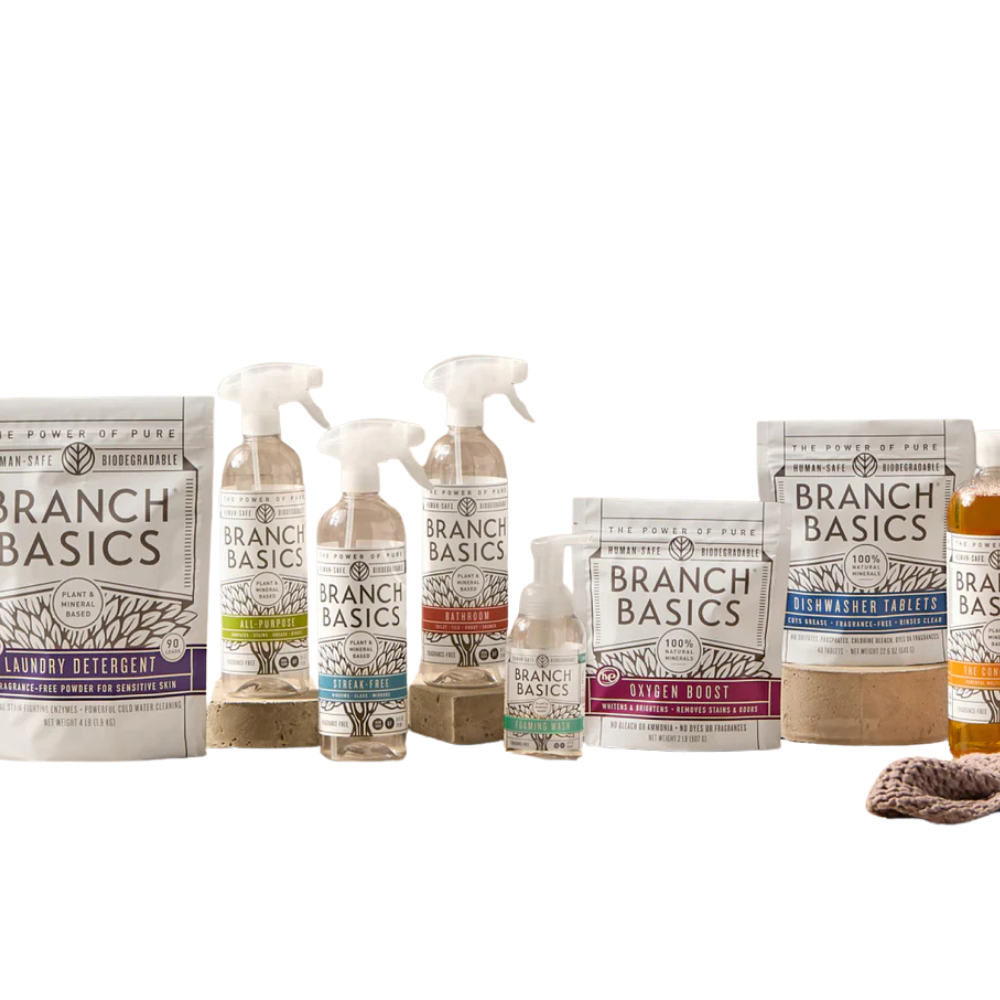
Switching to a plastic-free dishwasher detergent doesn’t mean compromising performance; it simply requires understanding how to get the most out of it. Whether using dishwasher tablets, powder, or a bio-enzyme detergent, here’s how to make it work effectively.
How to Use Dishwasher Tablets or Powder
- Remove food debris from your dishes before loading. Plastic-free detergents aren’t magic—they still require some help to work optimally.
- Place one tablet (or the recommended powder) into the detergent dispenser. For powders, use the scoop if provided or follow the manufacturer’s directions on the label.
- If your machine has a pre-wash compartment, skip it unless instructed to do so most plastic-free detergents are designed for a single cycle.
- Close the dispenser and run the cycle as usual. For best results, choose a standard or heavy-duty setting with high temperatures, especially if you are dealing with grease or stuck-on food.
- Run hot water in your sink for a few seconds before starting the dishwasher. This helps some products, especially bio-enzyme dishwasher detergents, activate more efficiently from the beginning.
Works with All Dishwasher Types
Plastic-free detergents are designed to work in both standard and high-efficiency (HE) dishwashers. They break down cleanly without leaving plastic residue or buildup inside your machine. Some also include plant-based boosters for hard or soft water cleaning.
If you have hard water, consider using a clean rinse aid (look for one without synthetic dyes or fragrances). This can help prevent cloudy glassware or streaks without adding more chemicals to your wash cycle.
Why I Avoid Dishwasher Pods with PVA Film
Many dishwasher pods are wrapped in a “dissolvable” film made from polyvinyl alcohol (PVA or PVOH). While it disappears in your dishwasher, that doesn’t mean it breaks down safely once it leaves your home.
PVA is often marketed as biodegradable, but the reality is more complicated. A 2024 study published in Science of the Total Environment found that PVA/starch blends degraded by 23%-100% in marine conditions, depending on the formulation. In other words, “dissolvable” doesn’t mean it entirely disappears in nature—especially when the blend or environment isn’t optimal.
Even in wastewater treatment systems, PVA doesn’t reliably break down. A 2021 study published in the International Journal of Environmental Research and Public Health found:
- Only partial degradation of PVA occurs in typical U.S. wastewater treatment plants
- Around 61% ends up in sewage sludge, which is often applied to farmland as fertilizer
- Another 15.7% may pass through in treated water, potentially entering rivers, lakes, or oceans
So while PVA film dissolves in your dishwasher, it can persist in soil or water, raising long-term concerns for ecosystems and food systems. If your goal is a truly plastic-free dishwashing routine, pods with PVA film don’t make the cut.
Don’t Miss: Eco-Friendly Laundry Detergent 👉 If you’re swapping to plastic-free cleaning in the kitchen, don’t stop there. See which eco laundry detergents deliver clean clothes and a cleaner planet. Read more →FAQs on Plastic-Free Dishwasher Detergents
Most plastic-free formulas are gentle and dishwasher-safe for everyday items. However, avoid using them on silver-plated dishes, sterling silver, hand-painted ceramics, or anything marked “hand wash only.” Even natural detergents can dull finishes or speed up wear on delicate pieces. When in doubt, wash those items by hand.
In both lab tests and real kitchens, many plastic-free dishwasher detergents hold their own against traditional brands and sometimes outperform them. The tablets dissolve fully, plant-based enzymes tackle grease and stuck-on messes, and there’s no lingering chemical scent. Just make sure the formula suits your machine and water type. Eco-friendly options still need the right fit to work their best.
Want proof? Check out the study Blueland conducted on their dish products to see how their detergent performs.
If you or someone in your home has sensitive skin, look for fragrance-free, dye-free, and PVA-free detergents. Synthetic fragrances and dyes can leave residue on dishes that may irritate the skin or airways after handling.
Choose products that carry trusted third-party certifications such as EPA Safer Choice, MADE SAFE, or EWG Verified. These labels confirm the formula has been screened for known irritants and toxins.
✨ Try: Branch Basics and Blueland, both gentle on hands, skin, and indoor air while still delivering spotless results.
Yes — most plastic-free dishwasher detergents are designed to work in both standard and high-efficiency (HE) dishwashers, even with hard water.
If you notice film or cloudy glassware, try adding a clean rinse aid that’s free from synthetic dyes and fragrances. Natural options made with citric acid or vinegar can help break down mineral buildup.
This Has Been About Plastic-Free Dishwasher Detergents
Choosing a plastic-free dishwasher detergent isn’t just about what you’re avoiding, like plastic tubs, dissolvable films, and harsh chemicals. It’s about what you’re choosing instead: safer ingredients, eco-friendly packaging, and less waste with every load.
Dishwashing might seem like a small habit, but it adds up fast. Swapping in bio-enzyme tablets, refillable tins, or compostable pouches turns a daily chore into a daily win for your home and the environment.
Featured image is from Blueland.
📚 References
- Cheung, C.K.H., & Not, C. (2024). Degradation efficiency of biodegradable plastics in subtropical open-air and marine environments: Implications for plastic pollution. Science of the Total Environment, 938, 173397. https://doi.org/10.1016/j.scitotenv.2024.173397
- Rolsky, C., & Kelkar, V. (2021). Degradation of polyvinyl alcohol in US wastewater treatment plants and subsequent nationwide emission estimate. International Journal of Environmental Research and Public Health, 18(11), 6027. https://doi.org/10.3390/ijerph18116027
- Time Magazine. (2024, June 17). Are dishwasher pods really biodegradable? https://time.com/7320935/dishwasher-pods-plastic
